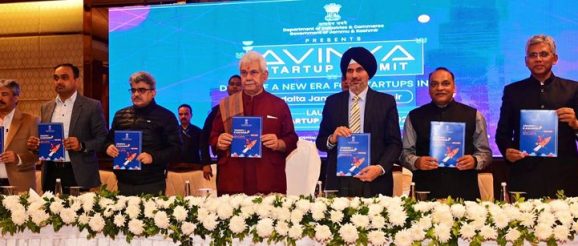Jammu & Kashmir Launches Ambitious Startup Policy to Foster Innovation and Economic Growth – Startupsmeet.com

Jammu and Kashmir‘s Lieutenant Governor, Manoj Sinha, has unveiled a comprehensive new startup policy designed to nurture entrepreneurship and foster a dynamic business ecosystem within the Union Territory. The launch of the ‘New Jammu & Kashmir Start-up Policy- 2024-27’ marks a significant milestone in the region’s journey towards realizing its full potential as a hub for startups and innovators. The policy, announced at the Avinya Startup Summit, is set to provide critical support mechanisms and incentives for budding entrepreneurs, with a clear goal of establishing 2,000 startups within Jammu and Kashmir by the year 2027. With a focus on inclusivity and sustainability, the policy offers patent-related assistance, financial aid for mentorship, DPIIT registration facilitation, and tailored support for startups operating across diverse sectors. Highlighting the Importance of the New Policy Lieutenant Governor Sinha underscored the importance of the new startup policy, describing it as a “giant leap for startups and innovators” within the Union Territory. He emphasized that the policy has been meticulously crafted to create a conducive environment for entrepreneurial growth and innovation, reflecting the administration’s steadfast commitment to fostering a vibrant startup ecosystem. Key Elements of the Startup Policy Among the key elements of the ‘New Jammu & Kashmir Start-up Policy- 2024-27’ is the establishment of a Rs 250 crore Venture Capital Fund, with an initial infusion of Rs 25 crore from the administration. This fund aims to provide crucial financial support for early-stage startups, encouraging the development of viable business models and fostering innovation across various sectors. Additionally, the policy seeks to empower entrepreneurs through the provision of entrepreneurship facilities to students and women. It also outlines support mechanisms for startups from both government and private sectors, as well as high net-worth individuals (HNIs), further enhancing the startup ecosystem within the Union Territory. Furthermore, the policy emphasizes the importance of incubation centers and seed funding, with a focus on providing additional support to female entrepreneurs through the J&K Entrepreneurship Development Institute (JKEDI). This initiative is aimed at fostering innovation and providing opportunities for women to thrive in the entrepreneurial landscape. Challenges and Opportunities Addressing the audience at the Avinya Startup Summit, Lieutenant Governor Sinha highlighted the challenges and growth opportunities across different sectors in Jammu and Kashmir. With 722 registered startups in the Union Territory, including 254 women-led ventures, the startup ecosystem demonstrates a diverse landscape, with sectors such as construction and engineering, skill development, oil & gas transportation, IT consulting, business support services, food processing, and agri-tech emerging as key players. The Lieutenant Governor emphasized that the policy reflects a comprehensive understanding of the needs and requirements of startups, incubators, and policymakers, ensuring a supportive environment for entrepreneurial growth and innovation within the Union Territory. Inviting Investment and Collaboration In his address, Lieutenant Governor Sinha extended an invitation to potential investors from across the country to explore the vast opportunities present within Jammu and Kashmir. He called for collective action to build a dynamic economic environment where businesses can thrive, investments can prosper, and entrepreneurs can realize their aspirations. The launch of the ‘New Jammu & Kashmir Start-up Policy- 2024-27’ represents a significant step forward in the region’s efforts to foster innovation, entrepreneurship, and economic prosperity. With a robust framework in place and unwavering support from the administration, Jammu and Kashmir is poised to emerge as a leading destination for startups and innovators, driving socio-economic transformation and prosperity in the region.
